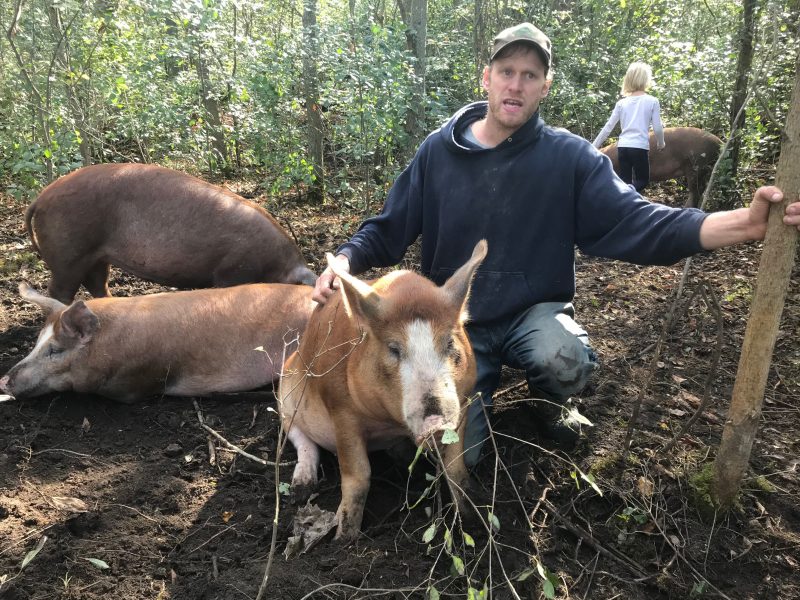Local couple offers a different perspective on farming

Tim Bakker, 36, talks about the benefit of letting pigs live in a natural forest glen has for his farm. Photo by Sarah Cooke, QNet News
PICTON – Five years ago, husband and wife duo, Tim and Angela Bakker, left their old careers to do something completely different.
Tim used to be a plumber/contractor and Angela used to be a nurse but that all changed after they watched the documentary Food Inc. in 2014 and shortly after they bought their farm in Prince Edward County.
It’s named Jubilee Forest Farm and it’s not your average farm.
Currently in its fourth year of operation, the Bakkers passionately advocate regenerative agriculture as a way to help mitigate the climate crisis and provide nourishing food for their family and community.
“Regenerative agriculture means that each year you improve the soil life, plant diversity and basically enhance the nutrition of the food that comes out the other end,” said Tim Bakker, the farmer at Jubilee.
Their big focus is on producing 100% grass-fed cattle, chickens, honey, maple syrup and eggs.
Their style of farming is work-intensive.
The Bakkers have to move the cattle to a new pasture every day. The chickens then follow the cattle and scratch through the cow patties to spread out the manure throughout the pasture which puts life organic matter back into the soil in turn improving the grass – or forages – for the cattle when they return to the pasture.
If this process is done right, it can actually lower the carbon footprint of the farm.
“There’s a saying,” Angela said, “that it’s ‘not the cow it’s the how’ so it (cattle farming) can be terrible for the environment or it can be a solution for climate change.”
“As the forages thicken, more plants are pulling more carbon out of the air and sequester it in the soil,” she said. “The higher the grass equates to the most carbon out of the air.”
The Bakkers focus on enhancing the symbiotic relationship between livestock and plant life with a little help from modern technology.
Another way they do this is by letting their pigs live free-range in a forest glen.
The pigs disturb the brush and help turn it from a forest into grassland.
“It’s called silvopasture, so it’ll be a few trees with lots of sunlight and grasses will start growing,” Tim Bakker told QNet. “Eventually the pigs will clear this, and I’ll help a little as well, but this area will become so productive that it’ll turn into a cow pasture and leveraged the right way, none of the trees or brush go to waste.”
The brush will be used for cow bedding in the winter which soaks up the manure which then gets spread onto the field in the spring further enhancing the soil nutrition.
He also emphasized the importance of grass growth for pulling carbon out of the air.
“If you think about how much grass grows yearly versus how much a tree grows a year, you actually pull more carbon into the soil with grass,” he said.
While regenerative farming is not for everyone, the Bakkers hope to raise more awareness of its benefits by offering tours of their farm to the public.
“Regenerative farming is not machine focused, it’s people focused,” he said. “This is people-centred farming. It takes people to move cows everyday and you can’t have a machine decide how much grass the cows need tomorrow.”
The biggest struggle the Bakkers face is that farms like Jubilee are up against conventional farms that supply big grocery stores and claim to sell organic meat but have misleading labels.
“It’s really hard to compete with grocery stores and the labels and the claims that they make,” said in an interview. “Only five per cent of regenerative farmers make it past year five and a big part of that number is failure to market.”
“Every year has been like ‘are we going to make it, are we going to make it,’ but this year is our year of ‘I think we’re going to be okay.'”
That’s because they’ve made sure to focus on their online marketing program which ensures they can sell their product.
The marketing side of farming can be just as tough as the farming itself.
“You can raise all the product you want but if you don’t sell it, you have nothing,” according to Tim Bakker.
They both emphasized that the only way to truly know what you’re buying is to go to the farm and see for yourself.
“We’re all about the one way – the only way – to know what you’re really getting is to know the farmer, not only that, but you have to come to the farm and see it yourself,” said Bakker.
 Print This Post
Print This Post






